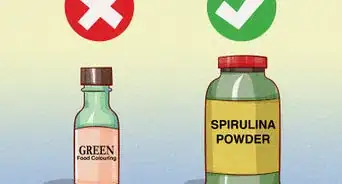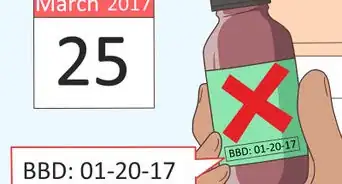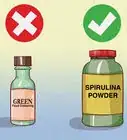This article was co-authored by Michele Dolan. Michele Dolan is a BCRPA certified Personal Trainer in British Columbia. She has been a personal trainer and fitness instructor since 2002.
There are 12 references cited in this article, which can be found at the bottom of the page.
This article has been viewed 34,305 times.
Conjugated linoleic acid (CLA) is widely touted as a beneficial supplement that can prevent heart disease, cancer, and diabetes. However, many of these claims are based on only preliminary research, so it is important to set reasonable expectations before you begin using CLA supplements. Don’t try to self-medicate using CLA, and don’t expect it to be a magic bullet for weight loss. Talk to your doctor before taking CLA to ensure the supplement will not negatively interfere with any of your current medications or health conditions. Always buy a high-quality brand and get a supplement containing the trans-10, cis-12 isomer.
Steps
Choosing Your Supplement
-
1Think about why you want to take CLA. There are number of claims made by people who manufacture and distribute CLA supplements. The primary reason people buy CLA is to lose weight. But CLA has also, in some studies, been linked to the prevention of heart disease, reduced likelihood for diabetes and various cancers, and stronger bones.[1]
-
2Get the right variety of CLA. There are several versions of CLA which vary at the molecular level. Evidence suggest that the most effective one contains the trans-10, cis-12 isomer (an arrangement of atoms). Trans-10, cis-12 CLA is sometimes stylized on supplement packaging or in medical articles as t10, c12 CLA. Use this type of CLA when possible.[2] [3]
- If you’re unsure what isomer a certain CLA supplement contains, ask the nutritionist at your local health store for assistance. They might have more information about the product.
- CLA supplements are made in two basic ways. Some are manufactured through chemical processes, while others are made using animal products like beef or dairy. In some cases, the supplements will be made of a combination of both methods. But these manufacturing methods don’t affect how effective the CLA is.
Advertisement -
3Buy a high-quality brand. Only purchase a brand of CLA that is respected. Many brands of supplements are not properly labeled and include ingredients other than those on the label. Ask doctors for a recommendation. Friends interested in good health might also be able to suggest CLA supplement brands they prefer. One sought-after and reputable brand is Tonalin.[4] [5]
- Tonalin brand CLA is readily available from major nutrition stores.
Beginning Your Supplement Regimen
-
1Consult a physician before you take CLA. Pay a visit to your doctor and inform them that you intend to begin a regimen of CLA supplements. Your doctor will be able to evaluate your health and determine if you would benefit from CLA or if you are at elevated risk for certain negative side effects. Your doctor might also be able to recommend more effective and practical alternatives to taking CLA based on the health outcomes you’re interested in.
- If you have diabetes, a heart condition, hypertension, or are pregnant or breastfeeding, you probably won’t be able to take CLA supplements.
- Depending on your other medications, your doctor might also discourage you from taking CLA.
-
2Set realistic expectations. CLA supplements offer few if any benefits in a weight loss program. While some CLA ads might offer overnight weight loss, or weight loss based exclusively on popping CLA, these are only messages designed to get you to buy the CLA supplement. The only effective way to lose weight is through a combination of regular exercise and a healthy diet.[6]
- Most of the research into CLA has been done on animals. The degree to which these results translate to humans is questionable or unknown.
-
3Try a natural alternative. CLA has many potential side effects. Instead of taking CLA supplements, you might consider instead consuming the animal products from which CLA is often derived. Lamb has the highest concentration of CLA per gram of fat, followed by cow’s milk, butter, cottage cheese, and ground beef.[7] [8]
- It is important to consume only grass-fed meat if you want to get the benefits of natural CLA. Animal products produced by the factory farm industry will not have adequate levels of CLA because their diet does not allow them to produce it in sufficient quantities.[9]
Using CLA Responsibly
-
1Always follow your doctor's advice and consult manufacturer directions. The manufacturer should provide directions for use and information about how to store and consume your supplement. Your supplement will probably be a small tablet or capsule that you need to take with water. The instructions label might also feature a chart that provides information about how often to take the supplement.[10]
- Your doctor’s instructions and knowledge of your own health should supersede any recommended intake advice provided by the CLA manufacturer.
-
2Look for side effects. There are a number of side effects associated with CLA supplements. These mostly include flu-like symptoms such as watery stools, vomiting, nausea, and general lethargy and fatigue. You might also experience headaches, dizziness, constipation, and/or hives (a kind of rash in the form of small, red bumps on the skin).[11]
- Clinical symptoms include higher levels of cholesterol, an enlarged liver and/or spleen, increased risk for diabetes, and reduced nutritional value in breast milk.
- Most people report that the side effects subside after about two weeks of regular use.[12]
-
3Don’t take CLA supplements instead of medication. Some people believe that supplements are an acceptable alternative to medication. However, medications receive far more testing and evaluation than do unregulated supplements like CLA. Medications are prescribed by a doctor, and carefully dosed in order to provide you with the right amount. CLA supplements cannot substitute for doctor-prescribed medications.
-
4Don’t take too much. CLA supplements come in different concentrations. Some supplements are 500 milligram (mg) tablets, others are 1,000 mg tablets. Research suggests that the average person needs no more than 3-4 grams of CLA per day. So if your supplement is 1,000 mg, you could take it three times per day and meet your daily CLA intake goal.[13] [14]
References
- ↑ https://www.ncbi.nlm.nih.gov/pubmed/12207834
- ↑ http://www.shape.com/weight-loss/tips-plans/ask-diet-doctor-will-cla-help-you-lose-weight
- ↑ http://www.marksdailyapple.com/cla-supplements/
- ↑ http://www.builtlean.com/2014/05/01/cla-supplement-research-review/
- ↑ http://www.nytimes.com/2013/11/05/science/herbal-supplements-are-often-not-what-they-seem.html?mtrref=undefined
- ↑ http://www.mayoclinic.org/healthy-lifestyle/weight-loss/in-depth/weight-loss/art-20046409?pg=2
- ↑ http://www.bodybuilding.com/fun/mike8.htm
- ↑ http://www.mayoclinic.org/healthy-lifestyle/weight-loss/in-depth/weight-loss/art-20046409?pg=2
- ↑ https://experiencelife.com/article/cla-can-this-fatty-acid-help-you-get-thin/
- ↑ https://nccih.nih.gov/health/supplements/wiseuse.htm
- ↑ http://www.mayoclinic.org/healthy-lifestyle/weight-loss/in-depth/weight-loss/art-20046409?pg=2
- ↑ https://experiencelife.com/article/cla-can-this-fatty-acid-help-you-get-thin/
- ↑ http://www.builtlean.com/2014/05/01/cla-supplement-research-review/
- ↑ https://experiencelife.com/article/cla-can-this-fatty-acid-help-you-get-thin/




































































Medical Disclaimer
The content of this article is not intended to be a substitute for professional medical advice, examination, diagnosis, or treatment. You should always contact your doctor or other qualified healthcare professional before starting, changing, or stopping any kind of health treatment.
Read More...